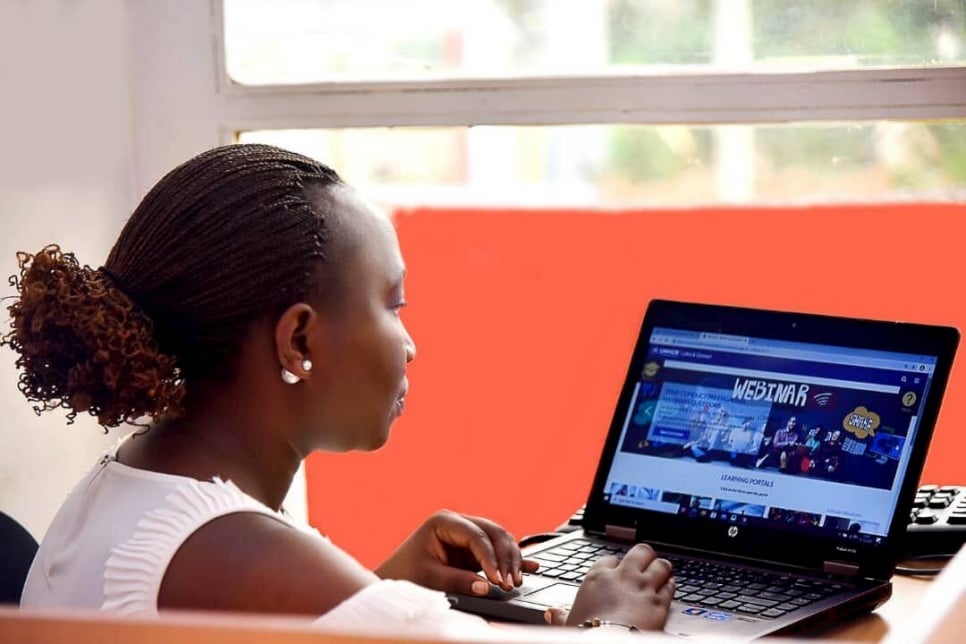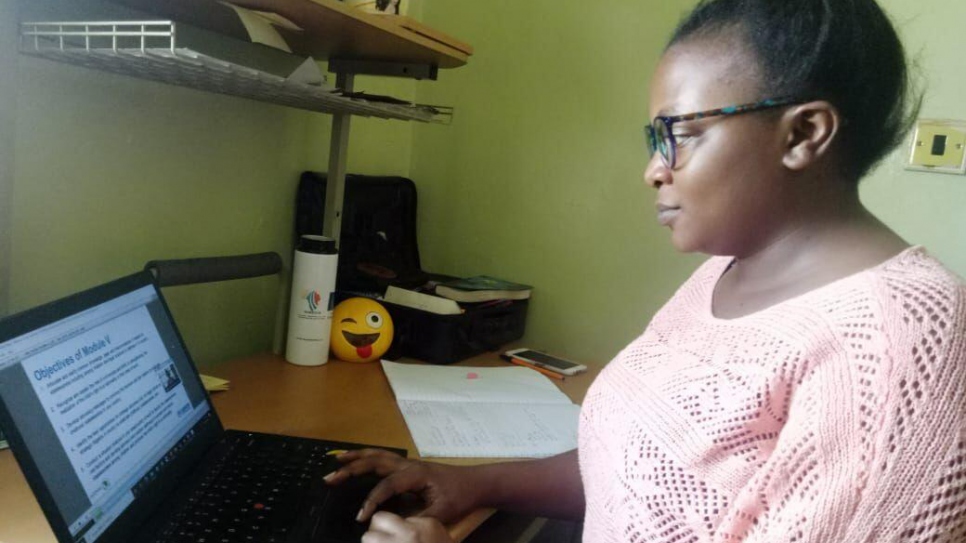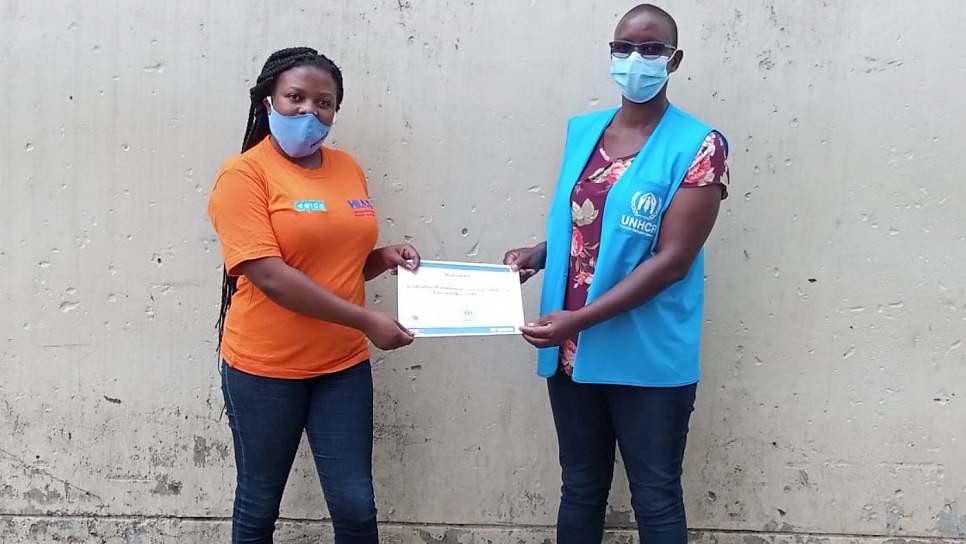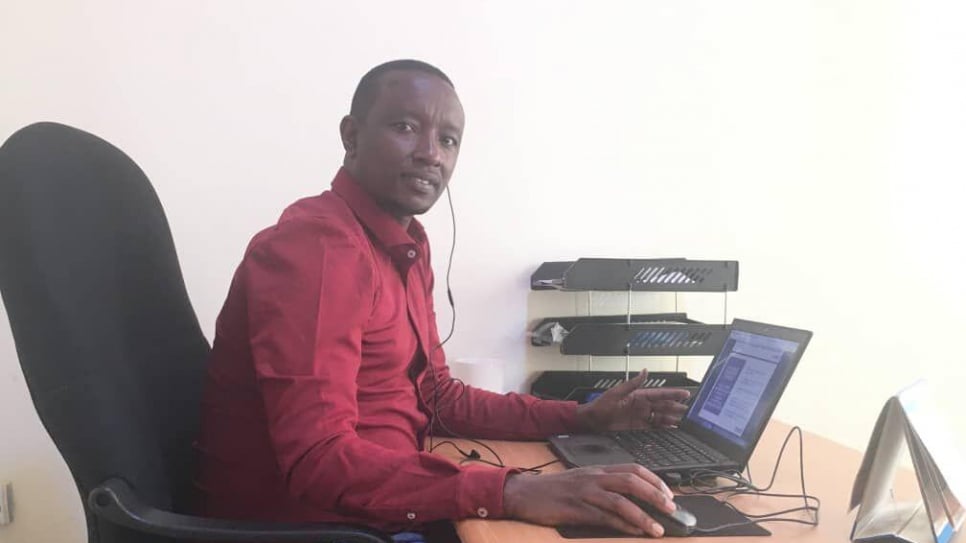Human and child rights advocates benefit from online course on ending child statelessness

Human and child rights advocates benefit from online course on ending child statelessness
UNHCR Regional Bureau, Nairobi, Caroline Opile, opile@unhcr.org, 12 Feb 2021
URL: https://www.unhcr.org/afr/news/stories/2021/2/60262e6e4/human-and-child-rights-advocates-benefit-from-online-course-to-help-end.html
UNHCR teams up with the African Committee on Experts on the Rights and Welfare of the Child to help eradicate childhood statelessness through an online course.
By Caroline Opile in Nairobi, Kenya | 12 February 2021

Yvonne Kagaju, a Protection and Monitoring Officer for Rwanda's National Commission for Human Rights attends the online course on 'Eradication of statelessness among children in East and Horn of Africa'.
© Photo courtesy of Yvonne Kagaju.
Initially, Yvonne Kagaju, was looking forward to travelling from Rwanda, to join a vibrant group of participants from eleven countries for a statelessness training workshop in Nairobi, Kenya. But COVID-19 disrupted this plan.
However, rather than cancel or postpone the workshop, titled ‘Eradication of Statelessness among Children in East and Horn of Africa,’ UNHCR, the UN Refugee Agency, and the African Committee on Experts on the Rights and Welfare of the Child (ACERWC)quickly adjusted and adopted it into a series of online webinars.
“Childhood statelessness is an extremely important human rights issue that cannot be delayed. The opportunity to train more advocates on childhood statelessness in the region was almost lost due to COVID-19, but the pilot online learning course opened the door to more possibilities,” says Clementine Nkweta-Salami, UNHCR’s Regional Director for the East, Horn of Africa and Great Lakes.
“As a result, we now have important advocates in nine African countries, willing to step up and work towards the goal of ending statelessness among children by 2024,"she adds.
Kagaju, from Rwanda, now sits quietly in her office in Kigali, ready to attend the online course.
“The webinar has helped me understand the situations that put children at risk of statelessness,” she says, adding that she is now more aware of the different international and regional instruments and conventions that are relevant in addressing child statelessness.
“Childhood statelessness is an extremely important human rights issue that cannot be delayed.”
She is among 33 people selected for the three-month pilot e-learning course on statelessness. Participants were drawn from NGOs, national human rights institutions and civil society organizations working on human rights and child protection. The learning consists of self-study materials including recorded videos, keynote speaker interventions, thematic webinars, reading material and tutored assignments for each of the five thematic modules.
Kagaju, a Protection and Monitoring Officer for Rwanda’s National Commission for Human Rights is passionate about children rights and this training could not have been timelier.
“Children, especially unaccompanied and separated children, are most at risk of statelessness,” she says, noting that governments have the power to end statelessness, if each state ratifies respective conventions and incorporates the norms into the relevant domestic laws
“We can eradicate statelessness among children because there is a legal framework that protects them,” she adds.
She hopes to use her newly acquired knowledge to empower a team of volunteers that work on child rights to enable them to identify children that are not registered and educate parents on the importance of birth certificates.
 Diana Mbiti, a Child Protection Officer based in Kenya, attends an online course on statelessness titled 'Eradication of Statelessness among Children in East and Horn of Africa'.
Diana Mbiti, a Child Protection Officer based in Kenya, attends an online course on statelessness titled 'Eradication of Statelessness among Children in East and Horn of Africa'.© Photo courtesy of Diana Mbiti.


Celestin Shema, also participating from Rwanda, considers the training an eye opener.
“I learned the difference between refugees and stateless persons,” he says.
He admits that the statistics shared during the training on the number of stateless people in Africa was a wake-up call.
“I am now a resource person on statelessness. If I don’t speak about it, no one will know about it,” he adds.
Shema provides legal assistance to asylum seekers that need support for registration and refugee status determination, through his work with UNHCR's partner organization, Prison Fellowship Rwanda. His interest in the statelessness training was born out of a desire to do more for the children he encounters in his day to day work at the faith-based organization.
“I am now a resource person on statelessness. If I don’t speak about it, no one will know about it.”
“There are refugee communities at risk of statelessness due to lack of birth certificates,” he says, noting that the government is putting systems in place to ensure every child is registered and issued with a birth certificate.
He admits that it was not easy to adapt to the online experience due to technical challenges and the impersonal interactions.
“So many of us are used to in person meetings but now we had to engage online and this requires discipline, time management and excellence,” he says.
Diana Mbiti, a Child Protection Officer at an international NGO in Kenya, has embraced online learning as a matter of necessity. While not her first time to attend a training on children statelessness, the course has increased her knowledge and awareness on the urgent need for advocacy to end childhood statelessness.
“Children are the first to suffer and the last to recover,” says Mbiti. “Advocacy is essential as children need to be included in our interventions to ensure no one remains stateless.”
Referencing Kenya’s recent recognition of two stateless communities, she notes that stateless people have been invisible for a long time, but the future looks promising.
“The recent recognition of stateless Shona and persons of Rwandan descent gives hope for other groups that remain stateless in the East, Horn and Great Lakes region,” she adds.
The workshop also aligns with Sustainable Development Goal Target 16.9 - to provide legal identity for all, including birth registration.
Ibrahima Kane, a human rights lawyer and one of the regional experts facilitating the pilot e-learning, reiterates that statelessness is a serious situation in Africa that requires detailed explanation for different stakeholders to understand the gravity of the problem.
“There is no single country in Africa that does not have statelessness,” says Kane. “As a first step, each country should ensure all births are registered irrespective of the legal status of the child and his parents or lack of parentage.”
“Advocacy is essential as children need to be included in our interventions to ensure no one remains stateless.”
Having worked with UNHCR in campaigns to eradicate statelessness in West Africa, he knows awareness and knowledge are key in ending statelessness. He regrets that stateless people remain invisible due to procedures that do not automatically grant nationality to stateless children.
Kane proposes that data on birth registration should be considered while legislative procedures on identification of stateless persons and access to nationality pathways should be simplified so that no one is left behind without a legal identity.
“The solution to ending statelessness lies in the adoption and domestication of regional instruments,” he says, referring to the African Charter of the Rights and Welfare of the Child as an example. “Human rights actors can achieve more by sharing best practices within the different regions in Africa on how to do this.”
Building on the lessons learned from this initiative, there are now plans to roll out a course on a child’s right to birth registration and a nationality to civil society and other actors from all AU Member States across the continent, in close collaboration with the ACERWC.